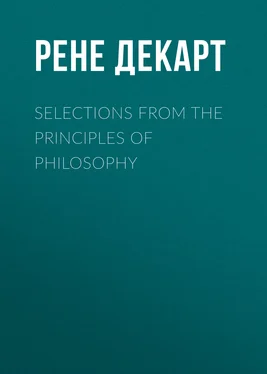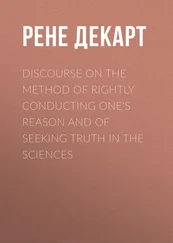Рене Декарт - Selections from the Principles of Philosophy
Здесь есть возможность читать онлайн «Рене Декарт - Selections from the Principles of Philosophy» — ознакомительный отрывок электронной книги совершенно бесплатно, а после прочтения отрывка купить полную версию. В некоторых случаях можно слушать аудио, скачать через торрент в формате fb2 и присутствует краткое содержание. Жанр: foreign_antique, Философия, foreign_edu, на английском языке. Описание произведения, (предисловие) а так же отзывы посетителей доступны на портале библиотеки ЛибКат.
- Название:Selections from the Principles of Philosophy
- Автор:
- Жанр:
- Год:неизвестен
- ISBN:нет данных
- Рейтинг книги:4 / 5. Голосов: 1
-
Избранное:Добавить в избранное
- Отзывы:
-
Ваша оценка:
- 80
- 1
- 2
- 3
- 4
- 5
Selections from the Principles of Philosophy: краткое содержание, описание и аннотация
Предлагаем к чтению аннотацию, описание, краткое содержание или предисловие (зависит от того, что написал сам автор книги «Selections from the Principles of Philosophy»). Если вы не нашли необходимую информацию о книге — напишите в комментариях, мы постараемся отыскать её.
Selections from the Principles of Philosophy — читать онлайн ознакомительный отрывок
Ниже представлен текст книги, разбитый по страницам. Система сохранения места последней прочитанной страницы, позволяет с удобством читать онлайн бесплатно книгу «Selections from the Principles of Philosophy», без необходимости каждый раз заново искать на чём Вы остановились. Поставьте закладку, и сможете в любой момент перейти на страницу, на которой закончили чтение.
Интервал:
Закладка:
I should also have added a word of advice regarding the manner of reading this work, which is, that I should wish the reader at first to go over the whole of it, as he would a romance, without greatly straining his attention, or tarrying at the difficulties he may perhaps meet with in it, with the view simply of knowing in general the matters of which I treat; and that afterwards, if they seem to him to merit a more careful examination, and he feel a desire to know their causes, he may read it a second time, in order to observe the connection of my reasonings; but that he must not then give it up in despair, although he may not everywhere sufficiently discover the connection of the proof, or understand all the reasonings—it being only necessary to mark with a pen the places where the difficulties occur, and continue to read without interruption to the end; then, if he does not grudge to take up the book a third time, I am confident he will find in a fresh perusal the solution of most of the difficulties he will have marked before; and that, if any still remain, their solution will in the end be found in another reading.
I have observed, on examining the natural constitutions of different minds, that there are hardly any so dull or slow of understanding as to be incapable of apprehending good opinions, or even of acquiring all the highest sciences, if they be but conducted along the right road. And this can also be proved by reason; for, as the principles are clear, and as nothing ought to be deduced from them, unless most manifest inferences, no one is so devoid of intelligence as to be unable to comprehend the conclusions that flow from them. But, besides the entanglement of prejudices, from which no one is entirely exempt, although it is they who have been the most ardent students of the false sciences that receive the greatest detriment from them, it happens very generally that people of ordinary capacity neglect to study from a conviction that they want ability, and that others, who are more ardent, press on too rapidly: whence it comes to pass that they frequently admit principles far from evident, and draw doubtful inferences from them. For this reason, I should wish to assure those who are too distrustful of their own ability that there is nothing in my writings which they may not entirely understand, if they only take the trouble to examine them; and I should wish, at the same time, to warn those of an opposite tendency that even the most superior minds will have need of much time and attention to remark all I designed to embrace therein.
After this, that I might lead men to understand the real design I had in publishing them, I should have wished here to explain the order which it seems to me one ought to follow with the view of instructing himself. In the first place, a man who has merely the vulgar and imperfect knowledge which can be acquired by the four means above explained, ought, before all else, to endeavour to form for himself a code of morals, sufficient to regulate the actions of his life, as well for the reason that this does not admit of delay as because it ought to be our first care to live well. In the next place, he ought to study Logic, not that of the schools, for it is only, properly speaking, a dialectic which teaches the mode of expounding to others what we already know, or even of speaking much, without judgment, of what we do not know, by which means it corrupts rather than increases good sense—but the logic which teaches the right conduct of the reason with the view of discovering the truths of which we are ignorant; and, because it greatly depends on usage, it is desirable he should exercise himself for a length of time in practising its rules on easy and simple questions, as those of the mathematics. Then, when he has acquired some skill in discovering the truth in these questions, he should commence to apply himself in earnest to true philosophy, of which the first part is Metaphysics, containing the principles of knowledge, among which is the explication of the principal attributes of God, of the immateriality of the soul, and of all the clear and simple notions that are in us; the second is Physics, in which, after finding the true principles of material things, we examine, in general, how the whole universe has been framed; in the next place, we consider, in particular, the nature of the earth, and of all the bodies that are most generally found upon it, as air, water, fire, the loadstone and other minerals. In the next place it is necessary also to examine singly the nature of plants, of animals, and above all of man, in order that we may thereafter be able to discover the other sciences that are useful to us. Thus, all Philosophy is like a tree, of which Metaphysics is the root, Physics the trunk, and all the other sciences the branches that grow out of this trunk, which are reduced to three principal, namely, Medicine, Mechanics, and Ethics. By the science of Morals, I understand the highest and most perfect which, presupposing an entire knowledge of the other sciences, is the last degree of wisdom.
But as it is not from the roots or the trunks of trees that we gather the fruit, but only from the extremities of their branches, so the principal utility of philosophy depends on the separate uses of its parts, which we can only learn last of all. But, though I am ignorant of almost all these, the zeal I have always felt in endeavouring to be of service to the public, was the reason why I published, some ten or twelve years ago, certain Essays on the doctrines I thought I had acquired. The first part of these Essays was a "Discourse on the Method of rightly conducting the Reason, and seeking Truth in the Sciences," in which I gave a summary of the principal rules of logic, and also of an imperfect ethic, which a person may follow provisionally so long as he does not know any better. The other parts were three treatises: the first of Dioptrics, the second of Meteors, and the third of Geometry. In the Dioptrics, I designed to show that we might proceed far enough in philosophy as to arrive, by its means, at the knowledge of the arts that are useful to life, because the invention of the telescope, of which I there gave an explanation, is one of the most difficult that has ever been made. In the treatise of Meteors, I desired to exhibit the difference that subsists between the philosophy I cultivate and that taught in the schools, in which the same matters are usually discussed. In fine, in the Geometry, I professed to demonstrate that I had discovered many things that were before unknown, and thus afford ground for believing that we may still discover many others, with the view of thus stimulating all to the investigation of truth. Since that period, anticipating the difficulty which many would experience in apprehending the foundations of the Metaphysics, I endeavoured to explain the chief points of them in a book of Meditations, which is not in itself large, but the size of which has been increased, and the matter greatly illustrated, by the Objections which several very learned persons sent to me on occasion of it, and by the Replies which I made to them. At length, after it appeared to me that those preceding treatises had sufficiently prepared the minds of my readers for the Principles of Philosophy, I also published it; and I have divided this work into four parts, the first of which contains the principles of human knowledge, and which may be called the First Philosophy, or Metaphysics. That this part, accordingly, may be properly understood, it will be necessary to read beforehand the book of Meditations I wrote on the same subject. The other three parts contain all that is most general in Physics, namely, the explication of the first laws or principles of nature, and the way in which the heavens, the fixed stars, the planets, comets, and generally the whole universe, were composed; in the next place, the explication, in particular, of the nature of this earth, the air, water, fire, the magnet, which are the bodies we most commonly find everywhere around it, and of all the qualities we observe in these bodies, as light, heat, gravity, and the like. In this way, it seems to me, I have commenced the orderly explanation of the whole of philosophy, without omitting any of the matters that ought to precede the last which I discussed. But to bring this undertaking to its conclusion, I ought hereafter to explain, in the same manner, the nature of the other more particular bodies that are on the earth, namely, minerals, plants, animals, and especially man; finally, to treat thereafter with accuracy of Medicine, Ethics, and Mechanics. I should require to do this in order to give to the world a complete body of philosophy; and I do not yet feel myself so old,– -I do not so much distrust my strength, nor do I find myself so far removed from the knowledge of what remains, as that I should not dare to undertake to complete this design, provided I were in a position to make all the experiments which I should require for the basis and verification of my reasonings. But seeing that would demand a great expenditure, to which the resources of a private individual like myself would not be adequate, unless aided by the public, and as I have no ground to expect this aid, I believe that I ought for the future to content myself with studying for my own instruction, and posterity will excuse me if I fail hereafter to labour for them.
Читать дальшеИнтервал:
Закладка:
Похожие книги на «Selections from the Principles of Philosophy»
Представляем Вашему вниманию похожие книги на «Selections from the Principles of Philosophy» списком для выбора. Мы отобрали схожую по названию и смыслу литературу в надежде предоставить читателям больше вариантов отыскать новые, интересные, ещё непрочитанные произведения.
Обсуждение, отзывы о книге «Selections from the Principles of Philosophy» и просто собственные мнения читателей. Оставьте ваши комментарии, напишите, что Вы думаете о произведении, его смысле или главных героях. Укажите что конкретно понравилось, а что нет, и почему Вы так считаете.












